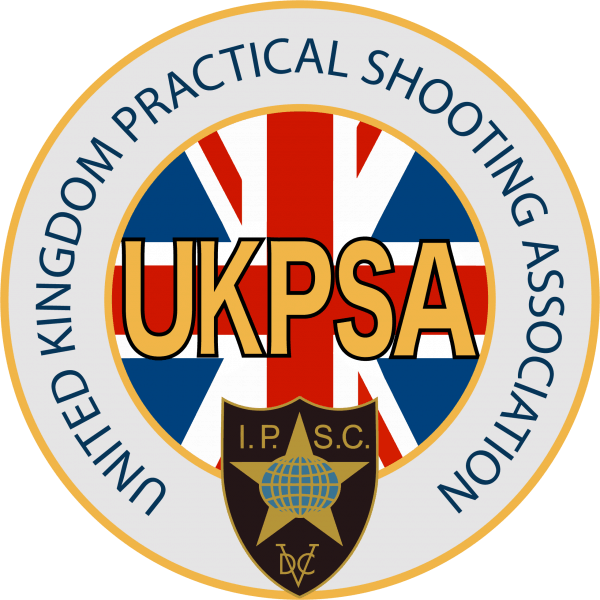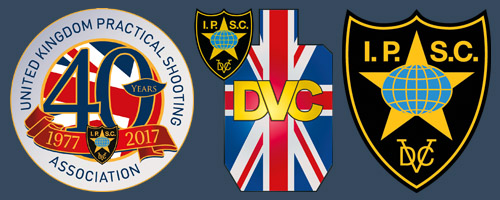IPSC and UKPSA Disciplines
The UKPSA supports many different disciplines of practical shooting within the UK. These include Shotgun, Handgun, Long Barrel Pistol/Revolver, Pistol Caliber Carbine, Rifle, Mini Rifle and Action Air. Practical Shooting is the second most popular international target shooting discipline and is the fastest growing of the shooting sports The International Practical Shooting Confederation (IPSC) is the worldwide governing body for practical shooting today and numbers some 85 affiliated nations including most European countries. The motto for practical shooting is DVC, Diligentia, Vis, Celeritas. Which is Latin for accuracy, power, speed. All elements should be equally tested when participating in practical shooting.
The governing body of IPSC practical shooting in Great Britain is the United Kingdom Practical Shooting Association, (UKPSA) which administers the sport, sanctions graded and championship competitions, selects the National Teams, organises training and maintains discipline and rules within the sport. The UKPSA represents Practical Shooting on the British Shooting Sports Council and maintains close liaison with other shooting organisations, representing the interests of the sport and of its members to all authorities. Founded in 1977, the UKPSA has grown steadily over the years and we have affiliated clubs throughout GB. A democratically elected body runs the Association and appoints members to carry out specific tasks. This Council has five elected executive officers, Chairman, Regional Director, Secretary, Treasurer and Public Relations Officer. These appoint the Heads of the Executive Commissions (National Range Officers Institute and UKPSA Training), Regional Organisers and specific discipline Secretaries and co-opted members who make up the Full Council of the UKPSA. All active practical shooters join the UKPSA which in turn makes them members of the IPSC allowing them to shoot in any Practical match in any discipline anywhere in the world. Members receive the Association’s regular digital journal “eDVC” and have access to the members Forum where views and advice can be exchanged along with notices about matches, results and courses. UKPSA members also have insurance cover.
Members may speak, vote, and stand for office at the annual general meetings of the Association. They have the right to consult the minutes of the Association and to attend Council meetings as observers. They may qualify for classification awards, hold titles and trophies and be selected to the National Squads or to UKPSA teams at overseas competitions. Members have the experience and expertise of the Association to call upon in case advice or support is needed. Indeed, the UKPSA welcomes novice shooters and equally represents shooters of all ages and abilities, and specifically recognises junior, lady, and senior classes and supports National teams for men and women.
SAFETY
In line with the strict safety requirements eye and ear protection is mandatory for all UKPSA shoots (eye protection is mandatory for Action Only). Only one shooter completes a course of fire at a time, strictly supervised one on one, by a trained and qualified Range Officer. Infraction of safety rules invokes immediate disqualification from the match and may result in disciplinary proceedings. However, this is a very rare occurrence. Overall, to date ALL the practical shooting disciplines have an exceptional safety record.
The UKPSA is committed to maintaining the highest standards of training, firmly believing that ensuring that all shooters are trained to a common syllabus reinforces its excellent safety record. It is not a requirement to be a UKPSA member to attend training courses but unless you do so you will not be able to compete in any UKPSA sanctioned event. The UKPSA two-day safety course had become known as the ‘basic’ course, but this title did not do justice to its well-established structure or the importance of its role in the training syllabus. The safety course is intensive, and many people have been amazed by their own achievements by the end of the fourteen hours of instruction. A typical course will start with lectures covering an introduction to the sport, safety, equipment and techniques. This will lead to the various shooting exercises, which start with the absolute basics of safe gun handling and move forward steadily to include pre-match preparation and eventually a qualification exercise. The emphasis on the course is SAFETY. Simply attending the course is no guarantee of passing; indeed, many students pass the course but are not, in the instructors view completely ready for competition. They can return, when they have achieved further shooting experience to qualify to competition ready. A course pass to competition ready standard is a prerequisite for entry into any UKPSA approved competition.
There are many people that have attended training courses during the past years that have decided for whatever reason not to continue with the sport of practical shooting. However just about all would agree that the course was beneficial in some way or other. Many have expressed the view that the training, with the heavy emphasis towards safe gun handling, can be applied to all other shooting disciplines regardless of whether a rifle, shotgun, full bore, small bore or gas-powered pistol is involved.
The UKPSA is also committed to having the best-trained match officials. Our training is based on the International Range Officers Association (IROA) global training programmes, delivered by very experienced instructors who are also active UKPSA Range Masters.
The UKPSA positively encourages and supports all safe target shooting, whether it is target shotgun, clays, long range rifle etc as they all count as good practice.
COMPETITIONS
One of the prime responsibilities of the Association is to provide a full UK shooting calendar, or rather to channel and coordinate the activities of clubs wishing to host major events. In this it has been very successful. But Practical Shooting is a world-wide sport with many UK members travelling across the globe, with America, South Africa, Eastern Europe and Asia being popular destinations.
As well as Handgun, the UKPSA fully supports Practical Shotgun, a demanding, testing and very rewarding discipline. Members have participated European Shotgun Championships since 2003 and in the World Championship. Closer to home there is a full competition calendar for Shotgun, as well as Mini-Rifle (.22 rifle), Long Barrel Revolver/Pistol, Pistol Caliber Carbine, Action Air and Rifle. The competition season for Shotgun, LBP and Action Air now consists of many national matches, some of which are at an international level, and a major championship, the British Open. UKPSA venues continue to provide fresh challenges and new ideas and a special thanks must go to the range and build crews for their untiring efforts. These are exciting and challenging competitions.
So, what is ‘practical’ shooting? The idea is simple. The shooter tackles competitive ‘stages’ requiring varying numbers of rounds and using different shooting positions, against the clock. The appeal of the sport lies in the diversity of the courses of fire available to the shooter – they are different for every match. Targets vary in size, shape, position and material – metal, paper or frangible – from a variety of distances (from 3 to 300 metres). Matches are open to all UKPSA members, for further details of the matches click here.
We also have a helpline manned by a Council Member. They may not have answers to all your queries instantly, but they will use their best endeavours to steer you in the right direction. The Hotline number is: 07010 703845 (note that this a premium rate number). Or you can email secretary@ukpsa.org or even ask the membership at large by posting a message on the Bulletin Board.
IPSC Shotgun
The UKPSA led the development of this discipline and our members to compete in a series of championship matches nationally every year as well as at international events across the world. British teams compete regularly at continental and world championships.
Handgun
Since the handgun ban in Great Britain in 1997 this has posed a lot of problems for UKPSA members who want to participate in IPSC pistol competitions.
Some members keep pistols stored for them in European countries and travel to matches in these countries. Also, where legal, UKPSA members have been able to borrow the equipment needed to participate in graded practical pistol competitions in Northern Ireland and abroad. This has enabled the UKPSA to still be represented at international matches, sponsoring teams at the European and World Championships.
Long Barrelled Pistol/Revolver
The UKPSA supports the use of long-barrelled revolvers and pistols (.22LR only) in competitions based on the IPSC Handgun rules. As well as being great competitions these matches allow UKPSA competitors to develop and practice the skills required for IPSC handgun shooting.
Rifle
IPSC Rifle is shot in Britain with typical courses of fire seeing targets at distances from 25-300 metres, although longer distances are also used at some matches. The targets used in the UK are predominantly ‘paper’ rather than metal because of range regulations, and there can also be range restrictions on fire and movement by civilians on areas operated by Landmark who control the use of military ranges.
Whilst IPSC Rifle recognises four principal divisions, only one these can be used in the UK because of the restriction on the use of semi-automatic centrefire rifles.
Mini Rifle
Shot using compact .22LR semi-automatic rifles, as well as being very challenging in its own right, Mini Rifle is a great (and economical) way to practice for IPSC Rifle and IPSC PCC. With targets out to 100m as well as at close range it is a great test of marksmanship and quick gun handling.
Pistol Caliber Carbine
PCC is dominated by 9mm semi-automatic carbines which aren’t available in Britain, but you can shoot these interesting stages using a UK-legal pistol calibre rifle. The UKPSA rule amendment (see below) recognises the different pistol calibres in common use but other than that the discipline is shot to the IPSC rules.
Action Air
Action Air has become popular since IPSC formally recognised it as a discipline, and there are several UKPSA sanctioned matches held throughout the year. With less bang and shorter distances, speed and accuracy are the order of the day for Action Air Shooting, but safety is of course always a prime concern. Action Air also provides an excellent way to learn important skills should you decide to participate in other disciplines that use firearms.

